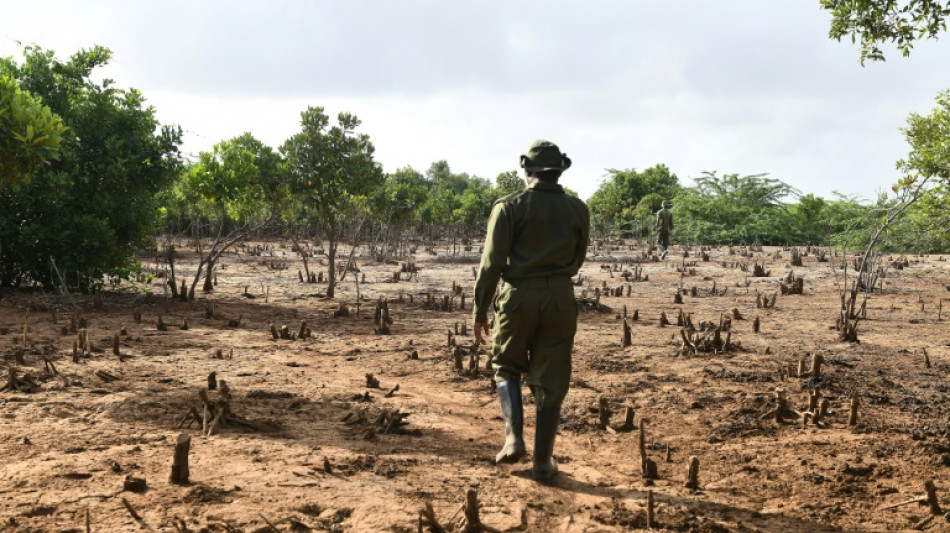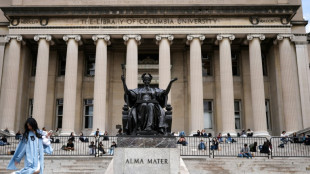
-
 Jubilant Peruvians celebrate new pope at mass in adoptive city
Jubilant Peruvians celebrate new pope at mass in adoptive city
-
Scottish refinery closure spells trouble for green transition

-
 Convicted ex-Panama president Martinelli granted asylum in Colombia
Convicted ex-Panama president Martinelli granted asylum in Colombia
-
IPL chiefs in talks about restart following ceasefire: reports

-
 Navarrete beats Suarez on technical decision to keep title
Navarrete beats Suarez on technical decision to keep title
-
Scans clear Wallabies fly-half Lolesio of serious back injury

-
 Leo XIV to address faithful with St Peter's prayer
Leo XIV to address faithful with St Peter's prayer
-
T-Wolves grab 2-1 NBA playoff series lead as Celtics get key win

-
 Gaza war casts shadow over Cannes film festival
Gaza war casts shadow over Cannes film festival
-
'Treasure hunt': tourists boost sales at Japan's Don Quijote stores

-
 Cannes Festival: the films in competition
Cannes Festival: the films in competition
-
Cannes film festival: what to look out for

-
 Jordan hospital treats war casualties from across Middle East
Jordan hospital treats war casualties from across Middle East
-
As Trump family's Gulf empire grows, rulers seek influence, arms, tech

-
 S. Korea conservatives choose presidential candidate after last-minute chaos
S. Korea conservatives choose presidential candidate after last-minute chaos
-
Trump hails 'total reset' in US-China trade relations as talks continue

-
 Film claims to name killer of slain journalist Shireen Abu Akleh
Film claims to name killer of slain journalist Shireen Abu Akleh
-
Under Trump pressure, Columbia University ends semester in turmoil

-
 Putin proposes direct Ukraine talks but quiet on 30-day ceasefire
Putin proposes direct Ukraine talks but quiet on 30-day ceasefire
-
Trump hails US-China trade 'reset' after first day of talks

-
 Jeeno leads Boutier by one at LPGA Americas Open
Jeeno leads Boutier by one at LPGA Americas Open
-
Lowry, Straka share lead at windy Truist

-
 Messi suffers worst defeat in MLS as Miami fall again
Messi suffers worst defeat in MLS as Miami fall again
-
Celtics overwhelm Knicks to pull within 2-1 in NBA playoff series

-
 Toulouse crush Toulon to reach Top 14 semis as Castres pay tribute to Raisuqe
Toulouse crush Toulon to reach Top 14 semis as Castres pay tribute to Raisuqe
-
Marseille, Monaco clinch Champions League qualification from Ligue 1

-
 'One of those days': Atletico record-breaker Sorloth hits four
'One of those days': Atletico record-breaker Sorloth hits four
-
Toulouse's Ntamack suffers concussion in Top 14, Willemse nears exit

-
 Record-breaker Sorloth hits four as Atletico smash Real Sociedad
Record-breaker Sorloth hits four as Atletico smash Real Sociedad
-
'Weight off my shoulders': Bayern's Kane toasts breakthrough title

-
 Sinner grateful for 'amazing' support on Italian Open return from doping ban
Sinner grateful for 'amazing' support on Italian Open return from doping ban
-
Hamburg return to Bundesliga after seven-year absence

-
 Toulouse's Ntamack suffers concussion in Top 14 clash
Toulouse's Ntamack suffers concussion in Top 14 clash
-
India, Pakistan reach ceasefire -- but trade claims of violations

-
 'Long time coming': Bayern's Kane toasts breakthrough title
'Long time coming': Bayern's Kane toasts breakthrough title
-
US, China conclude first day of trade talks in Geneva

-
 Kane tastes first title as champions Bayern bid farewell to Mueller
Kane tastes first title as champions Bayern bid farewell to Mueller
-
Benfica deny Sporting to take Portuguese title race to wire

-
 Sinner makes triumphant return from doping ban at Italian Open
Sinner makes triumphant return from doping ban at Italian Open
-
Sinner wins at Italian Open in first match since doping ban

-
 Leo XIV, new pope and 'humble servant of God', visits Francis's tomb
Leo XIV, new pope and 'humble servant of God', visits Francis's tomb
-
India claims Pakistan violated truce, says it is retaliating

-
 Champions League race hots up as Man City held, Villa win
Champions League race hots up as Man City held, Villa win
-
Kane tastes first title as champions Bayern see off Mueller

-
 US envoy calls enrichment 'red line' ahead of new Iran talks
US envoy calls enrichment 'red line' ahead of new Iran talks
-
Hastoy lifts La Rochelle as Castres pay tribute to Raisuqe

-
 Southampton avoid Premier League 'worst-ever' tag with Man City draw
Southampton avoid Premier League 'worst-ever' tag with Man City draw
-
Injury forces Saints quarterback Carr to retire

-
 S.Korea conservative party reinstates candidate after day of turmoil
S.Korea conservative party reinstates candidate after day of turmoil
-
Verdict due Tuesday in Depardieu sexual assault trial


Kenyans heal devastated land with the power of mangroves
Along a riverbank scarred by logging, Joseph Mwandenge Mangi points out a solitary mangrove tree, a species once abundant in the forest where the mighty Sabaki River meets the sea.
"This is the last one. There are no more left," said the 42-year-old Kenyan, who grew up on the estuary and possesses a seemingly encyclopedic knowledge of its flora and fauna.
The surviving tree is a sombre reminder for local communities working to restore this critical ecosystem to health, and make amends for the plunder of the past.
For generations villagers living near the Sabaki estuary had relied on its natural bounty for lumber and firewood, fresh water, seafood, farming land, and plants for traditional medicine.
Sustainably nurtured, the coastal wetland is also a resilient ally in the face of a changing climate -- storing carbon, filtering water pollution, and protecting against extreme weather and rising sea levels.
But years of unchecked exploitation inflicted terrible damage on the mangroves, mudflats, freshwater pools and sandy dunes at the mouth of Kenya's second-longest river.
Mangrove wood -- harvested sustainably for centuries to build traditional Swahili homes -- was chopped down to feed construction in fast-growing coastal towns like nearby Malindi, a popular tourism hub.
Locals overfished the river, using mosquito nets that trapped even the smallest of sea life.
Fertile soils were uprooted and washed downstream into the Indian Ocean, further reducing fish in the Sabaki and killing coral reefs offshore.
"The landscape has changed. Back in the day, we used to have a huge forest with elephants and monkeys," said Francis Nyale, a 68-year-old village elder, standing among a clearing of gnarled mangrove stumps.
- Climate ally -
But one tree at a time, local villagers are bringing the estuary back to life.
Further down the Sabaki, where its brown waters meet the blue ocean, and swarms of migratory birds flock overhead, a team of volunteers plant mangrove saplings along the riverbank.
They've planted tens of thousands in recent years, reclaiming cleared land and aiding significant forest regrowth, said Francis Kagema, coast regional coordinator from conservation group Nature Kenya.
There are early signs that their efforts are paying off.
Crouched in a grove of older trees, Kagema spotted clusters of tiny green shoots bursting out of the dark soil -- evidence of natural regeneration, an ecosystem on the mend.
"The world is changing, a lot. But for the mangroves, their ability to bounce back... and colonise the areas they used to be in the past, is quite encouraging," he said.
These remarkable trees also deliver for the planet many times over -- mangroves can absorb five times more carbon than forests on land, and act as a barrier against storm surges and coastal erosion.
Protecting mangroves is 1,000 times cheaper per kilometre than building seawalls against ocean rises, according to the UN Environment Programme (UNEP), which sponsors the Sabaki restoration project.
"Healthy wetlands –- critical for climate mitigation, adaptation, biodiversity, and human health and prosperity –- punch above their weight in terms of benefits," said Leticia Carvalho, UNEP's principal coordinator for marine and freshwater.
- 'Our trees, our heritage' -
For local communities, there are economic benefits in rehabilitating nature.
UNEP estimates that a single hectare of mangrove forest can deliver anywhere between $33,000 and $57,000 per year economically.
In Sabaki, local guides are supplementing their income by leading visitors and school groups to see the hippos and birdlife that call the estuary home.
Work is under way to improve tourist facilities, expand traditional beekeeping in the forest, and open a nursery for plant saplings.
Convincing the Sabaki's four villages that there is value in conservation requires careful diplomacy and a local touch, said Mangi, who leads a community group restoring the estuary.
They are working with fishermen to abandon unsustainable practices, and volunteer rangers who catch loggers in the estuary handle offences in-house to keep everyone on side.
"We don't take them to the police. We talk to them. We want them to understand that please, there is something good in these trees (rather) than cutting," said Mangi.
Jared Bosire, from the Nairobi Convention, a regional environmental partnership for the Western Indian Ocean, said the Sabaki community was demonstrating how local approaches to conservation could prove mutually advantageous.
"The hope is there will be lessons learned that could be replicated in other areas," said Bosire, the Convention's project manager.
More than 80 percent of mangroves have already been lost along western parts of the Indian Ocean.
For Mangi, there would be no community without them: "If we don't have these trees, we lose our heritage."
X.Karnes--AMWN